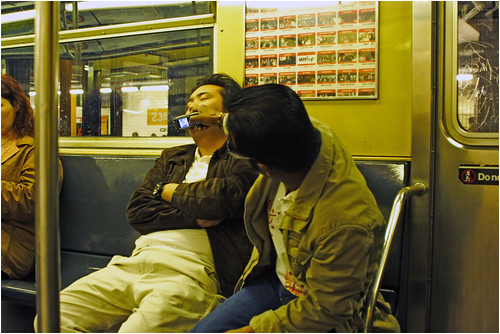
Abusing sleeping people is just one of the many things you can already do with your cell phones in the subway. (Photo by flickr user Dr Joolz)
When last we saw the underground cell phone service plan, the MTA had just announced a $46.8-million deal with Transit Wireless to equip the subway stations with cell service. But what if you install a cell service system and no carriers come?
That’s the question Scott posted in his comment, and that’s the question Crain’s New York Business pondered as well. The business journal noted that “it remains to be seen” if cell service providers are going to pony up the dough to provide customers will snippets of cell service in areas where customers spend a relatively minimal amount of time.
Amanda Fung reports:
Some question how Transit Wireless will recoup all the money it has to spend on building the network. While it will be technically challenging to wire the stations, once a network is set up and operational, the success of it is riding on the wireless carriers’ participation. Carriers will have to determine if offering cell phone service on the subway platforms and stairwells will generate more revenue per user or reduce churn rate, analysts said…
A spokesman for Sprint Nextel said the company will review the fees and determine if it makes sense for the company to participate.
Verizon Wireless and T-Mobile would not comment on their plans. AT&T Wireless, which led a competing consortium made up of the other major carriers, declined to comment because it said the MTA had not informed the company of its decision.
Supposedly, Transit Wireless has already fielded inquiries from at least one wireless provider, but without AT&T on board, the MTA’s and Transit Wireless’ plan will lose much of it luster. Right now, AT&T, Verizon and T-Mobile duke it for the top spots. If AT&T users — including those using the iPhone — can’t take advantage of the system, you’ll end up with a poor excuse for a cellular system.
For a comparison there, look no further than Washington, D.C. When I lived in D.C. from August 2005 until June 2006, I could never use my then-Cingular/now-AT&T cell phone in the Metro because AT&T hadn’t opted to sign on to the service terms for underground signal retransmission. To tell you the truth, I wasn’t missing much.
This Holy Grail of subway cell service may just end up as another idea that sounded good on paper but didn’t work out economically. If the carriers don’t sign on, kiss that late-night underground phone call good bye.

4 comments
Frankly, I’m not worried. Moscow has (and has had a for a while) a similar system of service only in stations, but not in tunnels – partly because the Metro is so loud it would be pointless to try and speak in the tunnels – and the service is quite widely used. A major point in the favor of two of the main cell providers’ over the third is that the third has been lagging far behind in providing service in Metro stations. As soon as one carrier provides service in New York, the other carriers will have to follow suit in order not to lose the battle for new customers.
Granted, Moscow subway stations are much deeper and more pleasant to be in than New York ones, but people generally have to wait around and spend more time in New York; on balance, I think this still leaves the service at least equally as suited for New York.
(I should note that Moscow does not always have service outside of the downtown stations; i.e. many peripheral stations have no cell service)
http://web.mac.com/nathan.ashk...../Home.html
[…] next step is the toughest. As was the case back in 2007, it’s no sure thing carriers would sign up. Now, as then, the cell companies will have to make sure that the Transit […]
[…] underground. Since then, Transit Wireless, the MTA’s contractor chosen for the pilot program, failed to sign up carriers, appeared to be a bogus company, went belly-up for a few years and emerged in late 2010 with […]